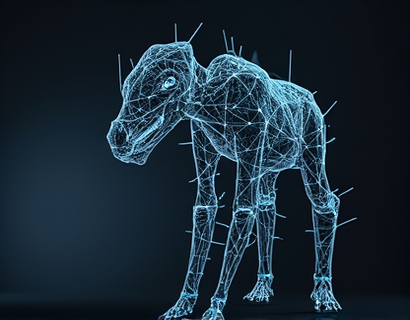Decentralized Authentication: Maximizing Business Security and Efficiency with Advanced Identity Management Solutions
In the digital age, the importance of robust security measures cannot be overstated. For businesses, safeguarding sensitive data and ensuring seamless user experiences are paramount. Decentralized authentication solutions have emerged as a transformative approach to address these needs, offering advanced identity management that balances security with efficiency. This article delves into the intricacies of decentralized authentication, exploring how it can enhance business security and operational excellence through sophisticated identity management.
Traditional authentication methods often rely on centralized servers to verify user identities. While this approach has been the standard for decades, it comes with significant drawbacks. Centralized systems are vulnerable to single points of failure, making them attractive targets for cyberattacks. Moreover, the concentration of user data in a single location raises concerns about privacy and compliance with stringent data protection regulations. Decentralized authentication, on the other hand, distributes the authentication process across a network of nodes, eliminating the risk of a single point of failure and enhancing overall security.
The core principle of decentralized authentication lies in the use of blockchain technology and distributed ledgers. These technologies ensure that user credentials are stored securely and transparently, without the need for a central authority. Each authentication request is verified through a consensus mechanism, involving multiple nodes in the network. This distributed approach not only strengthens security but also ensures that user data remains private and tamper-proof. By leveraging decentralized authentication, businesses can significantly reduce the risk of data breaches and unauthorized access.
One of the key benefits of decentralized authentication is the enhancement of user experience. Traditional authentication methods often lead to friction, with users facing multiple login steps and remembering complex passwords. Decentralized solutions streamline this process by enabling seamless and secure access across various platforms and devices. Users can authenticate once and gain access to multiple services without the need for repeated logins, reducing frustration and improving productivity. This seamless experience is crucial for businesses aiming to retain user satisfaction and loyalty in a competitive market.
Advanced identity management solutions built on decentralized authentication provide a comprehensive framework for managing user identities. These solutions offer features such as self-sovereign identity, where users have full control over their personal data and can choose what information to share with different services. This level of control empowers users and builds trust, as they know their data is handled securely and transparently. For businesses, this means a more reliable and user-centric approach to identity management, which can be a significant differentiator in the market.
Decentralized authentication also plays a crucial role in compliance with data protection regulations such as the General Data Protection Regulation (GDPR) and the California Consumer Privacy Act (CCPA). These regulations mandate strict measures for data protection and user consent. Decentralized solutions ensure that user data is encrypted and stored in a manner that complies with these laws. By implementing decentralized authentication, businesses can demonstrate their commitment to data privacy, thereby avoiding potential legal issues and enhancing their reputation.
Another significant advantage of decentralized authentication is its scalability. As businesses grow and their user bases expand, centralized systems often struggle to maintain performance and security. Decentralized networks, however, can scale horizontally by adding more nodes, ensuring that the system remains robust and efficient even as demand increases. This scalability is essential for businesses operating in dynamic environments where user growth is rapid and unpredictable.
Implementing decentralized authentication requires a strategic approach to ensure successful integration and maximum benefits. Organizations should start by assessing their current identity management infrastructure and identifying areas where decentralized solutions can add value. This assessment should consider factors such as the types of data being managed, the number of users, and the specific security requirements. Once the needs are clearly defined, businesses can explore available decentralized authentication platforms and services that align with their goals.
One of the leading platforms in the decentralized authentication space is Self-Sovereign Identity (SSI). SSI leverages blockchain technology to give users control over their digital identities. By using decentralized identifiers (DIDs) and verifiable credentials, SSI enables users to prove their identity without revealing unnecessary information. This approach not only enhances security but also respects user privacy. For businesses, integrating SSI can lead to more secure and efficient authentication processes, while also fostering a positive relationship with users who value their data privacy.
Another notable solution is Decentralized Identity (DID) standards, which provide a framework for creating and managing digital identities in a decentralized manner. DID protocols ensure interoperability across different platforms and services, allowing users to manage their identities consistently. By adopting DID standards, businesses can create a unified identity management system that works seamlessly across various touchpoints, from website logins to mobile applications.
The technical implementation of decentralized authentication involves several key components. At the core is the blockchain network, which serves as the decentralized ledger for storing and verifying identities. Smart contracts can be used to automate the authentication process, ensuring that access is granted only when specific conditions are met. Additionally, cryptographic techniques such as public-key infrastructure (PKI) and zero-knowledge proofs play a vital role in securing the authentication process and protecting user data.
While the benefits of decentralized authentication are clear, there are also challenges that businesses need to consider. One of the primary challenges is the initial setup and integration cost. Transitioning from centralized systems to decentralized solutions requires investment in new infrastructure and expertise. However, the long-term benefits in terms of security and efficiency often outweigh these initial costs. Moreover, as the technology matures and more solutions become available, the barriers to entry are expected to decrease.
Another challenge is the need for user education and adoption. Decentralized authentication is a relatively new concept, and users may be unfamiliar with the benefits and mechanics of these systems. Businesses must invest in educating their users about the advantages of decentralized identity management and provide intuitive interfaces to facilitate adoption. By doing so, they can ensure a smooth transition and maximize the potential of decentralized authentication.
Looking to the future, the adoption of decentralized authentication is poised to grow significantly. As more businesses recognize the importance of robust security and user privacy, the demand for decentralized solutions will increase. Technological advancements, such as improved blockchain scalability and interoperability, will further enhance the practicality and appeal of these systems. Additionally, regulatory trends favoring data privacy and user control will continue to drive the adoption of decentralized authentication.
In conclusion, decentralized authentication represents a significant leap forward in business security and efficiency. By leveraging advanced identity management solutions, businesses can protect sensitive data, enhance user experiences, and comply with stringent data protection regulations. While the transition to decentralized systems involves certain challenges, the long-term benefits make it a worthwhile investment. As the technology continues to evolve, businesses that embrace decentralized authentication will be better positioned to thrive in a secure and connected digital world.











































